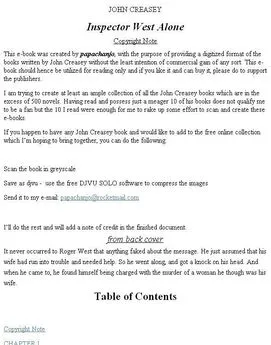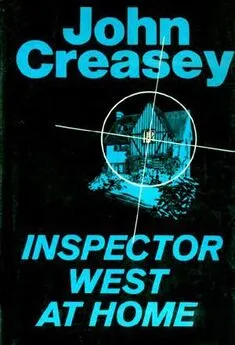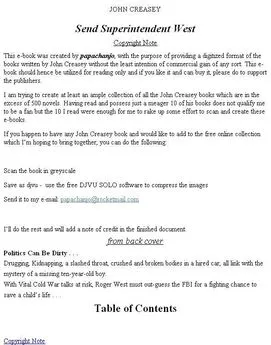John Creasey - Inspector West Alone
- Название:Inspector West Alone
- Автор:
- Жанр:
- Издательство:неизвестно
- Год:неизвестен
- ISBN:нет данных
- Рейтинг:
- Избранное:Добавить в избранное
-
Отзывы:
-
Ваша оценка:
John Creasey - Inspector West Alone краткое содержание
Inspector West Alone - читать онлайн бесплатно полную версию (весь текст целиком)
Интервал:
Закладка:
Delaney jumped to it then.
* * * *
Roger felt Delaney’s hands and body shaking.
“Take it easy,” he said.
They were in the fast car, half a mile from Brixton and no alarm had been raised. The waiter and the girl were now in the muddy grey Morris, which was still parked along the road. This car, a Buick, leapt along.
“You’ll be all right. Your wife has fixed this. There’s an aeroplane waiting to take you out of the country. Everything’s fixed—just sit back.”
There was little traffic on a Sunday night, and no need to go through the West End. Roger kept strictly down to the speed limit of thirty miles an hour while he was in the built-up area. Policemen, people, cars, and buses passed them, cinema lights glowed; but soon they were in the suburbs and on the main arterial road. Roger opened out. Delaney, who hadn’t uttered a word, said at last: “Who —who are you?”
“Never mind.”
“Where are we going?”
“Airfield, near Watford.”
“Are you sure——”
“There’s a whisky flask in the dashboard pocket. Have a good nip. You’ll be out of the country in two hours, and your wife will be with you.”
Delaney kept the bottle to his lips long enough to drain the flask. Roger watched the telegraph wires and poles flashing by. He’d altered his original plans in only one way; he’d driven along this road the previous night, so as to become familiar with it, and didn’t need a passenger for a guide. The lights of Watford stretched out in front of them, tiny glims in the darkness. They reached the airfield, where two aeroplanes, both small, were warming up. A flare glowed like a torch of liberty.
Beneath a tiny hangar, Mrs. Delaney waited. The pilot of their aircraft called : “You ready?” Two or three other people watched from the surrounding darkness, Roger felt their gaze. Was Kennedy here ? Or Percy ? He felt the keen wind as he opened the door. Delaney got out the other side, and his wife rushed towards him.
“Save it!” snapped Roger. “Get in.”
She turned towards him, and there was just enough light to show her beauty and the glow in her eyes. She thrust a thick packet into his hands.
He watched them climb in; saw the mechanic take the chocks away from the wheels, and stood by the side of the car as the aircraft taxied along the even grassland and then took off. Roger didn’t wait any longer, but got back into the car and drove as far as the gates. There, a smaller car was parked with the headlights on.
A man stood by it: Percy.
“Not bad,” Percy said. It was the nearest thing to a friendly word that he had uttered.
“Change the number plates of that Buick before you go anywhere,” Roger said. “And don’t go back along the main road. Risk a late night.”
“Think you were followed?”
“I know I wasn’t followed. I also know the fantastic coincidences that can catch crooks.”
“Okay, okay,” said Percy. “Your night out.”
No one was in Lyme Street, no one watched from the shadowy doorways. Roger walked briskly from the Strand, and turned into his doorway. As he unlocked the front door he glanced right and left. Now that he was back and it was over, his heart beat like a trip-hammer. He stepped inside and closed the door, then wiped off the perspiration on his forehead. So often he had waited, at just such a place as this, to catch a crook who believed that he’d been completely successful. He switched on a landing-light, which had another control switch upstairs. The building was silent. He reached his own door—the flat—unlocked it and went inside. It was Harry’s night out, and the flat was in darkness. He went from room to room, switching on the lights. He mixed himself a drink, looked at the dish of sandwiches and the plate of smoked salmon left for him by Harry, and laughed. He lit a cigarette. Then he caught a glimpse of himself in the mirror. He showed signs of strain.
He took the packet which Mrs. Delaney had given him from beneath his coat. It was of brown paper, heavily sealed. He opened it. There were packs of one-pound notes inside, some new, most of them old, all tightly held together by adhesive paper. He counted one pack—a hundred. There were five packs. There was something else, too—a piece of cotton wool, which dropped from the paper and fell at his feet. He picked it up. Something hard was inside it. He unwrapped it, and a single diamond scintillated dazzlingly, the size of a small peanut, worth— he couldn’t guess what it was worth.
There was a fortune in crime.
He washed, then started on the sandwiches—he was ravenous. Half-way through, the telephone bell rang. He had to get up to answer it. He seldom had calls, and they were always from Kennedy or Percy. He lifted the telephone, and was surprised that his own voice was harsh.
“Hallo?”
“Mr. Rayner?”
“Yes, speaking.”
The man at the other end hung up without another word —and left his voice ringing in Roger’s ears. The voice had been unmistakable: Bill Sloan had called.
Why to-night?
Why now?
* * * *
Roger picked up the Sunday newspapers. His own Times, Observer , and Express were there, together with Harry’s Sunday Cry . He’d seen his own, glanced through the Cry —and suddenly stopped breathing.
His photograph—the real West’s—looked up at him.
He scanned the article, saw a mention of Copse Cottage, and sat very still.
CHAPTER XVI
BULL-DOG
THE front-door bell rang.
Sloan couldn’t have reached here as quickly as that, even if he’d called from a kiosk nearby. Roger got up, and the bell rang again. He went to it slowly, not worrying about the caller’s impatience, searching for any weakness in his own alibi.
The bell started to ring again as he opened the door.
Kennedy said: “Getting lazy ? Like someone to replace Harry on his night off?” He came forward.
Roger barred his way.
“You choose the damnedest times for coming. When you’re wanted you’re not here, when you’re not wanted you find your way. Is Percy downstairs with the car?”
“No.” Kennedy stood on the threshold, too startled to protest, and worried for the second time since Roger had known him. “What’s wrong?”
“I’ve just had a call from Detective Inspector Sloan, and I fancy he’s on his way here. I don’t know why he chose to-night, and I hope the reason isn’t what I think it might be. If I were you, I’d go into the office, wait until he’s come into this room, and then leave.”
“I don’t think I like your friend Sloan,” said Kennedy in a soft voice. He glanced over his shoulder towards the stairs. There was no sound.
Roger said: “Forget it, Kennedy. I’ll tell you here and now there’s one thing I won’t lake. That’s violence against the police.”
“Won’t you?”
“No. Get into the office.”
“Did he say he was coming here?”
“No, that’s why I think he is. He telephoned. The D’s have taken off, I can’t think of anything that’s gone wrong, except you calling.” The whispered voices couldn’t travel far, but he wondered if Sloan were here and near enough to see the shadows on the top landing. “Have you an office key?”
“You like giving orders, don’t you? Watch yourself.”
Roger said: “Hurry.”
Kennedy crossed the landing and let himself into the office, making hardly a sound. Roger went back to the living-room, put the money and diamond into a drawer, locked it and pocketed the key, then went slowly downstairs. He peered into the dark corners of each landing and the passage; there was no trace of Sloan, and nowhere the Yard man could hide. He opened the door and went into the street and strolled up and down; two people turned into the street, but neither took any notice of him or turned into Number 15. Sloan hadn’t arrived yet. He withdrew into the doorway and heard a car turn the corner. Headlights blazed and shone on to Number 15, but he dodged back in time to avoid them, left the door unlocked, and went upstairs.
He put on all the lights and was eating another sandwich when the flat door-bell rang. He let it ring, as with Kennedy, but Sloan wasn’t so impatient and didn’t ring again. When Roger opened the door, Sloan stood back from it, head on one side, smiling with taut lips.
“Who——” began Roger.
“Remember me?” asked Sloan.
Roger relaxed. “Well, well, it’s the policeman who came to my house-warming! Don’t you rest on Sundays?”
“Policemen never have any time off.”
“Come in and relax,” said Roger. He wished the lights weren’t so bright; putting all on had been a mistake. It was easy to understand mistakes which crooks made, now, the list of possible slips was a mile long. He felt a tug of the tension he had experienced when Sloan had first come here, and when he had seen Janet and Mark.
Sloan looked round and tossed his hat into a chair.
“You do yourself well.”
“I’m a successful business man. Have a sandwich.”
“Thanks.” If Sloan had a weakness, it was for food. “You’re very affable to-night.”
“I’ve been enjoying myself,” Roger said, and grinned. “You like these unofficial visits, don’t you?”
“I never pay calls when I’m off duty, you can call me the man who’s always on the job.”
“What will you drink?” asked Roger.
“Beer, if there is any.”
“Other people besides policemen drink beer.” The conversation was too slick. Roger hadn’t any idea whether Sloan had come because of the Brixton job, but as his mind roamed restlessly about the possibility, he didn’t see where he could have slipped up. He poured beer into a glass tankard and had a gin for himself; gin, because as Roger West, he had never drunk it. He kept his voice hard and spoke with little movement of his lips; he was more afraid of his voice than of anything else, when with Sloan. “What do you want?” he asked.
“That’s a leading question. Been places to-night, do you say?”
“A nice little girl,” Roger said dreamily. “Sweet and innocent, no intelligence, no questions, a nice little healthy little pleasant little animal. They still grow like that. Suppose you tell me why you want to see me.”
“I hope you’re in a more talkative mood than the last time.”
“You’ve discovered all you want to know about me, haven’t you?”
“Not enough. I don’t know all your friends.”
“The Kennedy one?” Roger laughed.
“Wrong name, right initial. Remember Mr. Kyle?”
Roger said, “Kyle, Kyle?” He stood his ground, but wanted to sit down. “Kyle—oh, the little crook who came to see me just before you arrived that day. Yes, I remember.”
“You’ve a good memory. Heard from him lately?”
“No.”
“Surprising,” said Sloan, and grinned. “He carried a slip of paper round in his pocket, with a different name on it, care of the Strand G.P.O. When he was brought in last, that piece of paper turned up. I went and collected a letter addressed to the alias from the Post Office. There was nothing written inside, but there were ten pound notes. Are you a philanthropist?”
“Not yet.”
“Did you send that money to him?”
“No. Ask him.”
“Don’t you know what happens to your friends?”
“He wasn’t a friend of mine. He——”
“Friends of yours are liable to die suddenly, aren’t they? By accident?”
“So he’s dead!” said Roger, and frowned. “What do you expect me to do? Cry about a man I’ve only seen once in my life, and didn’t want to see again ?”
Читать дальшеИнтервал:
Закладка:










